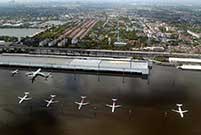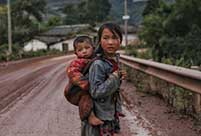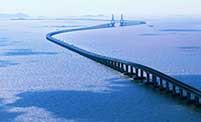

 |
| (Photo from Internet) |
The year 2015 is ending today. Most regions in the world will be looking toward 2016 with confusion and anxiety.
The economic slowdown in China brings a complex situation with it. But what is different here is that the public feels the government is reliable, and the government's confidence can influence the people.
Global affairs may still be difficult in 2016. But two things are basically clear.
First, the global economic difficulty is expected to persist. As long as China keeps its growth above 6.5 percent, the country will maintain relatively good development momentum.
Second, Russia, the EU and the US will continue to fight the Islamic State (IS), and probably break down the terrorist state and largely curb its influence. However, the Middle East will still remain a troubled region. The IS will not disappear. It will go on to create more troubles.
There are other uncertainties of course. In the US, the presidential election is more unpredictable than ever, as Donald Trump's popularity among Republican voters stirs deep worries from the rest of US society. Russia and Japan will also have parliamentary elections.
In Taiwan, polls show the Democratic Progressive Party is likely to win the next election.
It is difficult for Russia and the US to have normal ties. The China-US relationship is more predictable, but the South China Sea remains an uneasy factor. Russia and the US are both willing to improve their ties, and China and the US are both willing to expand their cooperation. But in reality, such goals are often hampered by some stubborn troubles.
For China or for the world, 2016 appears to be a period of stalemate. There may be no surprises. Chinese people should settle back and try to improve every aspect of life in details. After quantitative accumulation in a few years, China will gain new edges in comparison with other countries and regions.
China has launched a series of ambitious reform plans in the past three years. In 2016 we should focus on making these real. China's competition edge lies in the central government's capability to mobilize the nation. But such edge should not be cushioned by some local officials' laziness.
After more than three decades of high-speed growth, it is extremely difficult for China to keep a medium-high growth rate while trying to ensure a greener economy and greater social equality. It will be a difficult balancing job that needs to be explored in the new year.
If there are no big accidents, China should be able to keep its relative competitiveness in 2016. Of course, suspicions will remain both inside and outside of the country. It will be a test of China's perseverance.
 Are these the world’s scariest landing strips?
Are these the world’s scariest landing strips? In pics: Left behind children in China
In pics: Left behind children in China Eight modern day engineering marvels of China
Eight modern day engineering marvels of China Chinese beauty with sexiest bottom
Chinese beauty with sexiest bottom Charming female bodybuilders of Chengdu University
Charming female bodybuilders of Chengdu University Polish sports stars strip off for risqué calendar
Polish sports stars strip off for risqué calendar Spectacular aerial photos of the Three Gorges
Spectacular aerial photos of the Three Gorges Contestants of Mrs. Globe pose for photo in Shenzhen
Contestants of Mrs. Globe pose for photo in Shenzhen
 Bikini models attend hot pot banquet in Hefei
Bikini models attend hot pot banquet in Hefei Top 20 hottest women in the world in 2014
Top 20 hottest women in the world in 2014 Top 10 hardest languages to learn
Top 10 hardest languages to learn 10 Chinese female stars with most beautiful faces
10 Chinese female stars with most beautiful faces China’s Top 10 Unique Bridges, Highways and Roads
China’s Top 10 Unique Bridges, Highways and Roads Face of China 2015
Face of China 2015 A hard year 2015’s stories
A hard year 2015’s stories Smartphone makers jockey for dominance of Chinese market
Smartphone makers jockey for dominance of Chinese market Film star's posts stirs debates on Chinese, foreign medical services
Film star's posts stirs debates on Chinese, foreign medical servicesDay|Week